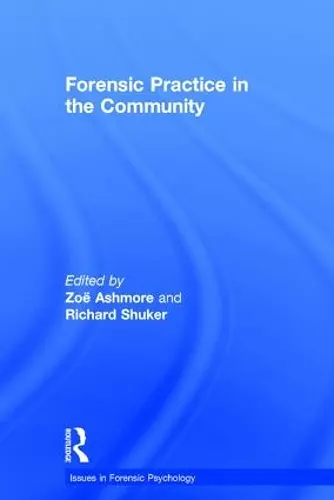Forensic Practice in the Community
Zoë Ashmore editor Richard Shuker editor
Format:Hardback
Publisher:Taylor & Francis Ltd
Published:25th Jul '14
Currently unavailable, and unfortunately no date known when it will be back
This hardback is available in another edition too:
- Paperback£49.99(9780415500326)

Forensic practice in the community is a neglected subject. There are many books looking at forensic work in secure settings, such as prisons or hospitals, but very little has been written about forensic practice in the community. This book describes the current and exciting developments in this area, for both young people and adults, by leaders in their field. It is in the community where interventions with those who have offended are all ultimately tested. Bringing together a range of experts from both the practitioner and academic community, this book covers:
•multisystemic therapy for families,
•sexual and violent offending,
•learning disabilities,
•substance misuse,
•risk assessment, prediction and management,
•personality disordered offenders
•resettlement following custody,
•desistance of criminal behaviour,
•community interventions.
Beginning with an overview of forensic practice in the community, the book addresses policy, practice and ethical issues, focusing on the specific dilemmas facing practitioners and providing an analysis of international perspectives. It describes how to meet the challenge of significantly diverting and reducing the prison population through more effective community intervention with adults and young people and also makes suggestions for the future.
This book offers a range of recent case studies, has descriptions of new areas of community practice by those working or studying in that area and covers cutting-edge developments in practice and policy. It will be of interest to academics, practitioners and students in forensic psychology, as well as social workers, probation officers, youth offending officers, police officers, criminal justice agencies and mental health professionals.
‘This book should be essential reading for all of those who are interested in working with offenders, young and old. Written by a group of leading practitioners and researchers, the book provides a detailed account of how to work in community settings in ways which not only address the psychological and social needs of offenders, but also effectively manage the risk of further offending occurring.’ - Professor Andrew Day, Clinical and Forensic Psychologist, Deakin University, Australia
‘This book provides a wide-ranging overview of theory and practice in a previously neglected area. This neglect is all the more remarkable because of the area's crucial importance at so many levels. The area - that of forensic practice in the community - now has a major new text to support and stimulate its growth.’ - Adrian Needs, Principal Lecturer, Department of Psychology, University of Portsmouth, UK
‘This book is a joy: clearly and straight-forwardly written, it addresses subjects which remain under-explored in the academic and professional literature. "Forensic" practice can mean many things, but the focus of this book is on helping criminal justice practitioners working in the community to assess their clients and, indeed, to assess whether they, the practitioners, are doing a good job. Community-based services are often the "poor relation" of custodial services, and not only in funding terms. Yet the job of practitioners working in the community is vitally important, hugely complex, and brings with it equally daunting moral responsibilities. This wise, honest, thoughtful and thought-provoking book will contribute hugely not only to the decision-making of those who have to make these decisions, but also to those academics and students who are thinking about the subject "from the outside".’ - Nicola Padfield, Master, Fitzwilliam College, Cambridge and Reader in Criminal and Penal Justice, University of Cambridge, UK
This book should be essential reading for all of those who are interested in working with offenders, young and old. Written by a group of leading practitioners and researchers, the book provides a detailed account of how to work in community settings in ways which not only address the psychological and social needs of offenders, but also effectively manages the risk of further offending occurring.
Professor Andrew Day, Clinical and Forensic Psychologist, Deakin University, Australia
This book provides a wide-ranging overview of theory and practice in a previously neglected area. This neglect is all the more remarkable because of the area’s crucial importance at so many levels. The area – that of forensic practice in the community – now has a major new text to support and stimulate its growth.
Adrian Needs, Principal Lecturer, Department of Psychology, University of Portsmouth
ISBN: 9780415500319
Dimensions: unknown
Weight: 589g
298 pages